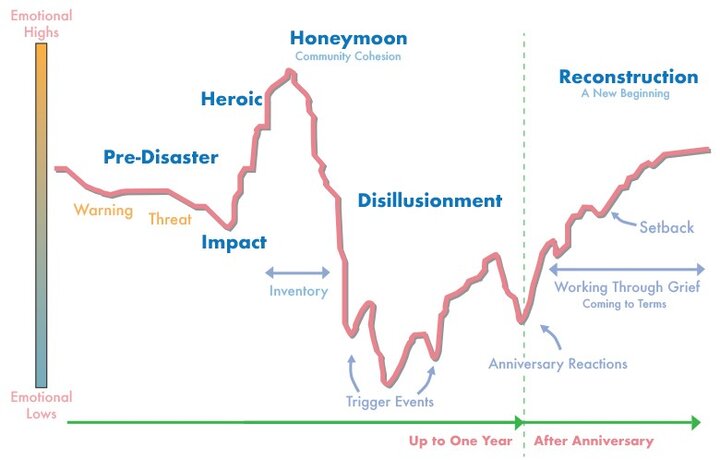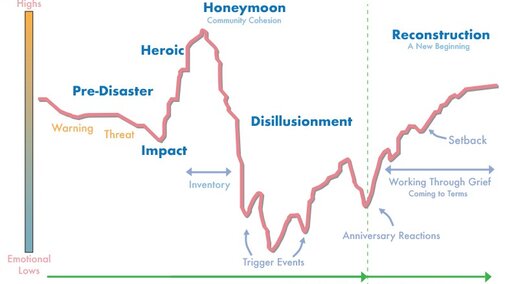Last spring Nebraska residents experienced a historic weather event that continues to affect many communities. The historic bomb cyclone that occurred in March 2019 changed the land and communities in many ways. As we approach the anniversary of this historic event, it’s important to understand the recovery process and how communities heal.
When a natural disaster strikes, there are predictable phases that communities go through. According to the Substance Abuse and Mental Health Service Administration, communities go through six phases starting from disaster impact and ending in recovery.

Phase 1 is marked by news of the impending natural disaster. This time is marked by uncertainty and fear.
Phase 2 is the impact phase; the time when the disaster strikes. During this time, there is a wide range of intense emotional reactions and numbing as communities “weather the storm.”
After the disaster has subsided, Phase 3, known as the heroic phase, starts. The heroic stage is characterized by high levels of activity and a sense of community altruism. Rescue efforts are often underway, and communities reach out in support of each other.
This quickly passes into Phase 4, the honeymoon where high levels of community cohesion and optimism abound. Disaster assistance is often readily available and communities’ bond over the rebuilding process. This phase, however, is short lived lasting only a few weeks or months.
Phase 5, disillusionment is a dramatic contrast to the honeymoon phase. Communities and individuals realize the limits of their resources and the challenges of rebuilding. The optimism of Phase 4 often turns to discouragement and stress. It is this phase that is the most worrisome for many professionals who work in disaster recovery. People often turn to less effective ways to cope such as substance use, isolation, and anger. This phase can last months and years and is often extended by trigger events such as anniversaries of the disaster or reminders that things are not the same.
Phase 6, reconstruction, is the goal and hope of each community after a disaster. In this phase, individuals and communities begin to see progress in the rebuilding process and adjustment to a “new normal” begins. Often the reconstruction phase begins around the first-year anniversary of the disaster and continues for some time after. Phase 6 is where relief workers and individuals and communities impacted by the bomb cyclone hope to find themselves at this upcoming year anniversary.
We know however that it may take more time to return to “normal”. Individuals impacted by the disaster may find that the following common responses are lingering especially around trigger times such as planting season or anniversary events:
- Intense or unpredictable feelings.
- Changes to thoughts and behavior patterns.
- Sensitivity to environmental factors such as loud noises or smells.
- Strained interpersonal relationships.
- Stress-related physical symptoms.
Even though these can be normal responses, if you have persistent feelings of distress or hopelessness and you feel like you are barely able to get through your daily responsibilities and activities, consult with a licensed behavioral health professional. These professionals are trained to help people address emotional reactions to disasters and life’s difficulties.
Behavioral health professionals can be located by utilizing the Nebraska Rural Response Hotline (1-800-464-0258). This tremendous resource is available free of charge to anyone in Nebraska agriculture who needs a helping hand. The Nebraska Rural Response Hotline is operated by the Interchurch Ministries of Nebraska and representatives from the Farmers Union, National Farmers Organization, Nebraska Department of Agriculture, Legal Aid of Nebraska, Women in Farm Economics, the UN-L Ag Extension Division; and lenders. When you call the Hotline, an experienced staff person will answer you directly to discuss issues and needs, provide helpful information, and make referrals to attorneys, financial counselors, clergy, other farmers, or mediation. In addition, staff assists callers in dealing with stress, depression, and other mental health abilities through the COMHT (Counseling, Outreach, and Mental Health Therapy) Program. No-cost vouchers and information on confidential mental health counseling are available. You don’t have to suffer; all it takes is reaching out. People are ready to help! We will all get through this, Nebraska Strong!
*Adapted from Zunin & Myers as cited in DeWolfe, D. J., 2000. Training manual for mental health and human service workers in major disasters (2nd ed., HHS Publication No. ADM 90-538). Rockville, MD: U.S. Department of Health and Human Services, Substance Abuse and Mental Health Services Administration, Center for Mental Health Services.
*Funding for the COMHT Program is provided in part, through the Nebraska Department of Health & Human Services, Office of Rural Health, and Community Service Block Grant.

